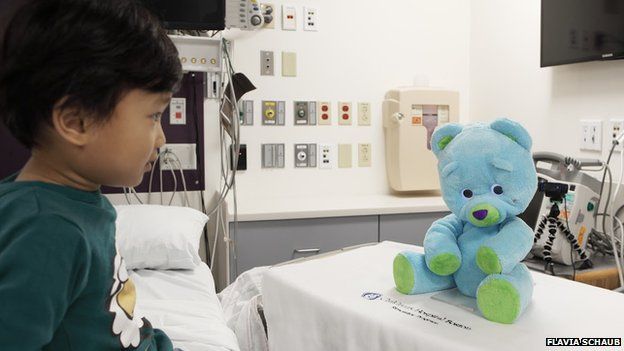Teddy tech: Rise of MIT's robot care bear Huggable
- Published

A robot teddy bear, early versions of which were tested in the Highlands, is being put through its paces in a children's hospital in the US.
Huggable is a project of the Personal Robots Group at Massachusetts Institute of Technology's Media Lab.
Eight years ago, a prototype design of the robot was shown to nursery children in Avoch, near Inverness.
A new version is now being used to research how robots could help sick or injured children.
An early prototype of Huggable was brought to Scotland by MIT Media Lab in 2006 in a project supported by Highlands and Islands Enterprise (HIE).
The UHI Millennium Institute - now the University of the Highlands and Islands - was also involved.
HIE is a member of a scheme that offers its staff and entrepreneurs to visit MIT.
Since then, MIT Media Lab's Personal Robots Group has worked with Chinese manufacturing company Jetta on the redesign of Huggable's mechanical components.
Sooyeon Jeong, who works on the project, said: "Huggable has been redesigned over the last four years.
"The robot integrates an Android smart phone for its computing power and sensors, and is in much smaller size, which makes it more portable and easy to set up.
"Now, the robot looks more infant-like and can portray more expressive gestures, compared to the older version of Huggable."
Most of physical parts of the robot were 3D printed.
The bear has been fitted with pressure sensors on two of its paws and several touch sensors throughout its body parts.
The screen of the smart phone device in the robot's head shows animated eyes and the robot can use the phone's internal speaker, microphone and camera for sensing.
The MIT team is working with staff at patients at the Medical Surgical Intensive Care Unit and oncology units at Boston Children's Hospital.
They have been studying how children's playful interactions with a robot compare with the effects of other interventions commonly used in the hospital, such as play with tablet devices and plush stuffed animals.
How children play with Huggable could help medical staff better understand how much pain, stress or anxiety a child is feeling.
The researchers have also been examining what effect the interaction has on the family members of young patients.
- Published24 October 2014
- Published29 November 2007